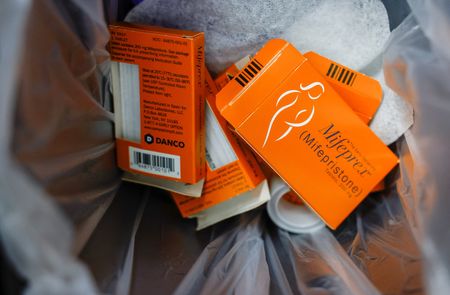 1
1 1
1
By Brendan Pierson
(Reuters) – The 5th U.S. Circuit Court of Appeals in New Orleans on Wednesday will hear the Biden administration’s bid to overturn a Texas judge’s order that, if allowed to take effect, would make the abortion drug mifepristone illegal.
However the 5th Circuit rules, the case will likely continue for months or years. Here is what you need to know about the case as it further unfolds:
WHAT IS MEDICATION ABORTION?
Medication abortion is a two-drug regimen consisting of mifepristone followed by misoprostol used to terminate a pregnancy within the first 10 weeks. It accounts for more than half of U.S. abortions.
Two companies sell mifepristone for medication abortion in the United States: Danco Laboratories, which sells the brand-name version Mifeprex, and GenBioPro Inc, which sells a generic version.
WHAT IS THE LEGAL DISPUTE ABOUT?
Anti-abortion medical associations led by the Texas-based Alliance for Hippocratic Medicine sued the U.S. Food and Drug Administration last year in federal court in Amarillo, Texas. They claimed the agency approved mifepristone for abortion in 2000 using an unlawful process and did not adequately consider the drug’s safety, asking U.S. District Judge Matthew Kacsmaryk to revoke the approval.
The FDA, along with mainstream U.S. medical associations, strongly disputes the claims. Danco intervened in the case to defend its drug.
HOW DID THE CASE GET TO THE 5TH CIRCUIT?
Kacsmaryk on April 7 issued a temporary order, known as a preliminary injunction, suspending mifepristone’s approval while the lawsuit proceeds. The injunction was not a final ruling, but Kacsmaryk found that the anti-abortion plaintiffs were likely to win on the merits.
The Biden administration and Danco appealed the injunction to the 5th Circuit. The U.S. Supreme Court has issued an emergency order putting Kacsmaryk’s ruling on hold during the appeal, keeping mifepristone on the market for now, but has not addressed the merits of the case.
WHAT COULD THE 5TH CIRCUIT DO?
Now that it has heard arguments, the panel could uphold Kacsmaryk’s injunction, which would suspend mifepristone’s approval while the case proceeds, or overrule it, which would keep it on the market until Kacsmaryk makes a final ruling.
The panel could also uphold Kacsmaryk’s order in part, allowing mifepristone to stay on the market but with significant restrictions. A different 5th Circuit panel did just that at an earlier stage of the case, though it was quickly overruled by the Supreme Court’s emergency order.
Finally, the panel could find that the plaintiffs have no standing to sue, as the government has argued, which would effectively end the entire case unless overturned on appeal.
No matter what the court does, the losing party will have a chance to appeal to the full 5th Circuit and then to the U.S. Supreme Court. Mifepristone will remain available without any new restrictions until all those appeals are finished.
All three judges on Thursday’s panel are conservatives with a record of opposing abortion rights.
WHAT ABOUT THE RULING FROM WASHINGTON STATE?
Minutes after Kacsmaryk’s order on April 7, U.S. District Judge Thomas Rice in Spokane, Washington, issued a preliminary injunction barring the FDA from placing any new restrictions on mifepristone. That ruling applies only in 17 Democratic-led states and the District of Columbia, which had argued the government should loosen special safety restrictions around the pill.
The injunction remains in effect. It would be in direct conflict with any future ruling restricting mifepristone, which would likely need to be resolved in another round of appeal.
ARE THERE ANY OTHER LAWSUITS OVER MIFEPRISTONE’S APPROVAL?
Yes. Abortion providers in Virginia, Kansas and Montana last week filed a lawsuit against the FDA similar to the Democratic states’ lawsuit in Washington.
GenBioPro last month sued the FDA in federal court in Baltimore, seeking an order barring the agency from pulling the drug off the market without going through a formal process that gives the company a chance to be heard.
GenBioPro argues that the FDA cannot simply suspend approval without such a process, “regardless of external attempts to interfere.” If successful, the lawsuit would set up another potential conflict with any future order restricting mifepristone.
GenBioPro is also challenging West Virginia’s abortion ban in a separate lawsuit, while a North Carolina doctor is challenging restrictions on mifepristone in that state. Both lawsuits claim that the state laws conflict with the FDA’s approval of mifepristone.
WHEN WILL THE TEXAS CASE BE FINALLY DECIDED?
Once all appeals over the preliminary injunction are over, the case can proceed to trial on the merits before Kacsmaryk, giving both sides a chance to present evidence. That could include evidence about the process the FDA used leading to mifepristone’s approval and about the drug’s safety record.
Kacsmaryk could then decide the case without trial, known as summary judgment, or hold a trial including witness testimony.
A final judgment from Kacsmaryk could be months or even years away. Once it does come, the losing side will again have the chance to appeal to the 5th Circuit and, eventually, the Supreme Court.
(Reporting By Brendan Pierson in New York, Editing by Alexia Garamfalvi and Bill Berkrot)